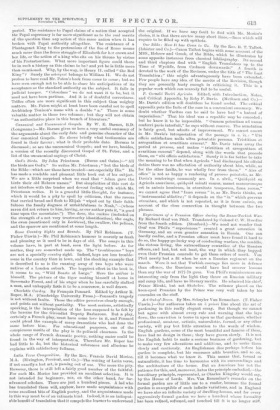doubt whether Tacitus can be said to have had "a
hatred of imperialism." That his ideal was a republic may be conceded ; but he knew it to be impossible. " Omnem potentiam ad unum conferri pacis interfuit," ho says without reserve. The annotation is fairly good, but admits of improvement. We cannot assent to Mr. Davis's interpretation of the passage in c. ix. : " Ubi officio satisfactum nulla ultra potestatis persona. Tristitiam et
arrogantiam et avaritiam exuerat." Mr. Davis takes away the period at persona, and makes " tristitiam et arrogantiam et avaritiam exuerat" depend, along with the words that precede
them, on "ubi officio satisfactum." Surely it is far better to take the meaning to be that when Agricola " had discharged his official duties there was no affectation of authority about him, while, as for the other faults, he was wholly free from them." "Airs of
office" is not as happy a rendering of persona potestatis, as Mr. Davis's renderings commonly are. In c. xlvii., " Quidquid ex
Agricola amavimus, quidquid mirati stunts, menet mansurumque est in animis hominum, in reternitate temporum, fame rerum," we cannot agree that "fame rerum" is, as Mr. Davis thinks, an
" instrumental ablative ;" it depends on the "in " which governs wternitate, and which is not repeated, as it is from animis, on account of the close connection in thought between the two phrases.




















































 Previous page
Previous page